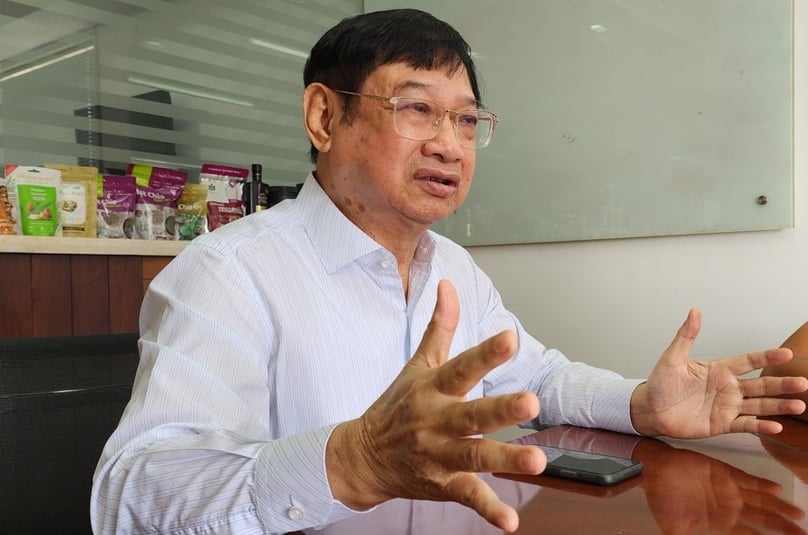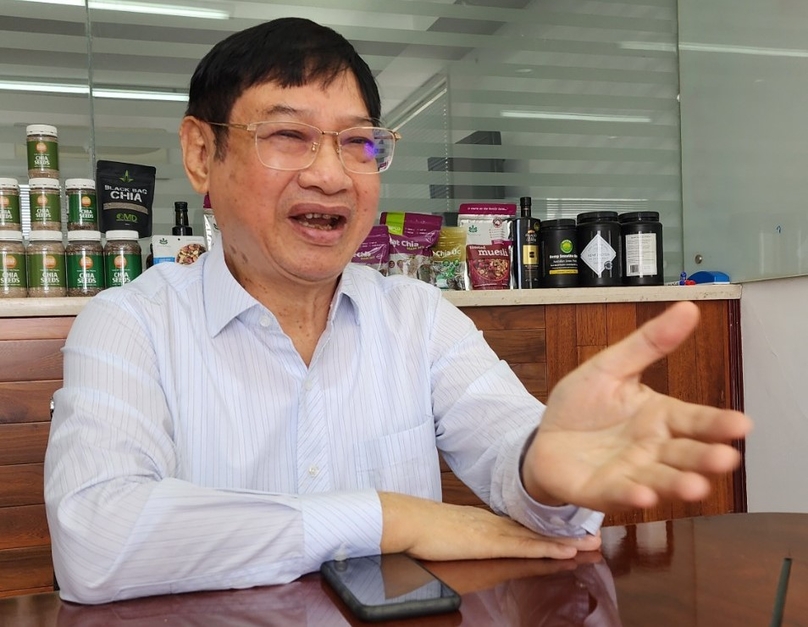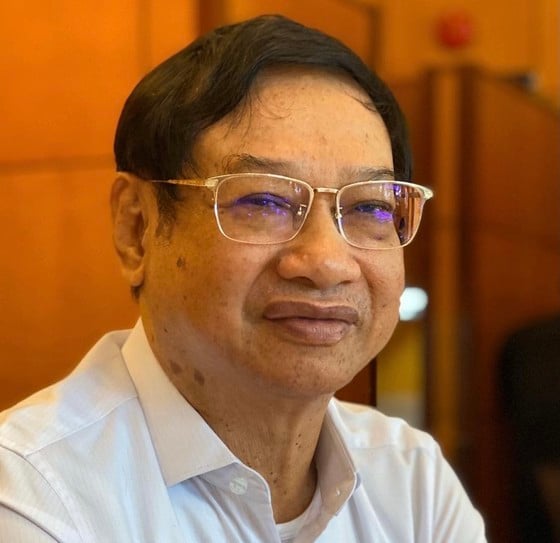
Death-row prisoner looks to resurrect business: my land assets worth billions now
Lien Khui Thin was one of the most well-known entrepreneurs in Vietnam in the 1990s. He was sentenced to death in 2000 in the major Epco-Minh Phung scam. The sentence was commuted to life imprisonment in 2003 and he was freed in 2009 under an amnesty program to become an entrepreneur again.

Businessman Lien Khui Thin. Photo by The Investor/Thai Son.
In a talk with The Investor on the occasion of Vietnamese Entrepreneurs’ Day, October 13, Lien Khui Thin, now 70, reminisces about the turbulence in his life and displays an abundance of positive energy in pursuing his new startup ideas.
You studied science and technology, but pursued the life of a businessman. How come?
I studied chemistry at the Saigon University of Sciences before 1975. After graduation, I worked for a Ho Chi Minh City Youth League unit. I had already established my position as a potential leader, but I decided to leave the public sector and move to the private sector in 1982 to have better income at a time when the country faced great hardship. Coming from the coastal province of Khanh Hoa, I thought of processing seafood for export.
In today’s terms, that would be a startup. How did you launch it?
Actually, I thought of it in a very simple way, just a change to make a living. Khanh Hoa, my hometown, could provide a lot of seafood. When living in the south, I gained access to foreign trade knowledge, so I thought of exporting processed seafood. At that time, few people did this across the nation, so I became a pioneer.
So your startup was doing something no one else had done then. Did you face many difficulties?
Almost nothing. I succeeded very quickly because the market had no supplier but me. Vietnamese seafood was loved a lot in overseas markets as they were delicious, not contaminated by pollutants and and cheap, and I kept expanding the export markets, including Australia, the U.S., Hong Kong, Singapore and so on.
I expanded production from a small operation to an enterprise, which then became Epco, an export, service and production company in District 3 as demand increased rapidly. In the early 1990s, there were years my export value was up to $150 million each.
But Epco did not mean just seafood…
More opportunities came up to do business. Foreign partners ordered more seafood like shrimp and some wanted coffee. They also introduced production machinery and equipment, as well as other products Vietnam lacked like petrol, fertilizers, iron and steel, milk and dairy products. Vietnam did not allow imports with foreign currencies then, so I did barter trade, goods for goods. This way, Epco created a market for all kinds of goods.
From its inception until 1994-1995, Epco grew vertically and expanded to multiple industries with 15 companies and two hotels.

Photo by The Investor/Thai Son.
Some people think that if there had been no Epco-Minh Phung incident, with its huge development potential, Epco would have matched today’s leading corporations. What do you think?
I think differently. I exported Vietnamese agricultural and seafood products to bring back money. My way was different, and I was different from other companies.
Years ago, Epco bought a lot of land in prime locations in Ba Ria-Vung Tau and Phan Thiet. Did you think about real estate business then?
No, because I bought land to build factories and trading centers. I was not thinking about dividing them into land plots to sell. At that time, when I bought prime plots of land in Vung Tau, I wanted to build a seafood urban area and marketplace, with facilities like warehouses and wharfs. Plots that I bought in Phan Thiet and Phan Rang, areas rich in seafood, were also to serve processing and production.
At that time, Epco had up to 15,000 workers. In order to export to foreign markets, we had to meet their standards in facilities, machinery, equipment, and the working environment. Not just that, I thought of hi-tech processing to increase values. Those plots of land I bought in the old days have now been zoned as urban areas, but I never sold a single piece.
You were arrested and imprisoned while you were a successful businessman. What did you experience then?
Before 1975, I joined revolutionary movements in the south, having my own ideals. And as a businessman, I also understood my problems and was ready to accept all consequences. At that time, there was a huge struggle between the conservative and the open-minded. I chose the second group to help the country get rid of poverty. This meant I had to take risks because the legal framework lagged behind real developments. At that time, the country’s leadership was also focused on the cause of developing the country, thus they did not mean to put me in jail.
What were your feelings when the court sentenced you to death?
It was like my life had ended, I could not think of anything. I spent a total of 12 years and 6 months in prison, including more than 1,000 days as a death row prisoner who saw friends taken to the execution ground. Just a complete collapse. I calmed down and thought a lot about being executed. The death penalty is for treason and murder, but I was guilty of neither. I knew I had done things against the law, but it was not that serious (a crime), so I had to appeal.
Later, I was granted amnesty three times: from death down to a life sentence, then down to 20 years in jail, and an early release, finally. I personally think those things reflect the extent of my behavior as well as the State’s treatment of entrepreneurs.
You spent a long time in prison and are continuing your business career when you are not young anymore. What motivates you?
I was released from prison in 2009 but had to wait until the end of the period when I was not allowed to do business to establish the Epco Trading Joint Stock Company. I got this name back because it used to reach out to world markets. I was found to be guilty, but Epco was not. The name is like my own son. It used to provide jobs for 10,000 workers or so. I want to restore Epco because I still have workers, markets, and my corporate reputation.
Before my arrest, Epco was a huge company with tens of millions of U.S. dollars in assets. But when I got out of prison, my factories, machinery, warehouses were all gone. My former associates, with the help of other people, had sold off many of my properties. Many plots of land worth tens of billions of VND each (VND10 billion = $417,000) were sold for VND200-300 million.
They sold machinery and equipment at my largest cold storage factory in Southeast Asia. Factories with 4,000-5,000 workers each previously became parking lots. And so on. I found all these wrongdoings and I want to bring them to light so the name of Epco does not die.
How different is today’s Epco from the past?
There’s so much difference. It just does product packaging and supplies to supermarkets. I can earn a few hundred million dongs (VND100 million = $4,170) a month to live on. Now I want to carry out projects that continue the previous legacy, but cannot go into the old markets because I have no capital nor can I get bank loans because I still have debts to the government.

Photo courtesy of Saigon Liberation newspaper.
Does this mean your sentence is not complete?
According to the court ruling, the defendants in the economic case must compensate the State with more than VND1,000 billion ($41.66 million). During my time in prison, I did compensate VND500 billion, equivalent to $50 million then. However, the other people involved in the case are all dead, so I have to shoulder the remaining half of the total. My real assets are huge, but some of them have been frozen due to disputes. If they could be liquidated, things would be simple for me.
I have repeatedly sent documents to authorities asking them to help me get out of the woods, but so far it has not happened. This has been going on for many years and has affected my legal rights and interests.
You say you still have lots of assets. What are they?
Mainly land. I still have vast amounts of land in Nha Trang, Binh Duong, Vung Tau and elsewhere. Based on the current prices, they are worth billions of dollars. Not to mention many other properties of mine that are being kept by others that I have petitioned to get back. All my moves on these issues are as per the law, and I hope I can succeed so as to fulfil my obligations to the government.
These problems have lasted for long. You are already old, how long can you wait?
I’m still living in a rented house. I use budget food and don’t need much. What I want is that authorities, through my case, are able to understand well the economy, business people, legal mechanisms and frameworks. I’ll use the assets I mentioned to develop my Epco company, not to give them to my children.
If you can get back your properties, what are your plans?
I will invest in agriculture because this is an issue of the times. Vietnam has a lot of agri-businesses but their efficiency is not high for many different reasons. I think agriculture has two important factors – food and renewable energy. If possible, I will plant sorghum as our soil conditions are suited for this crop. Its seeds can be used as food and the plant itself used to make energy tablets. This crop can be harvested in just three months while others take a long time.
At the same time, I will invest in a series of international-standard cold storage facilities in the Mekong Delta to store farm produce, rice, fruit, seafood, and others. This is in the direction of sustainable development.
